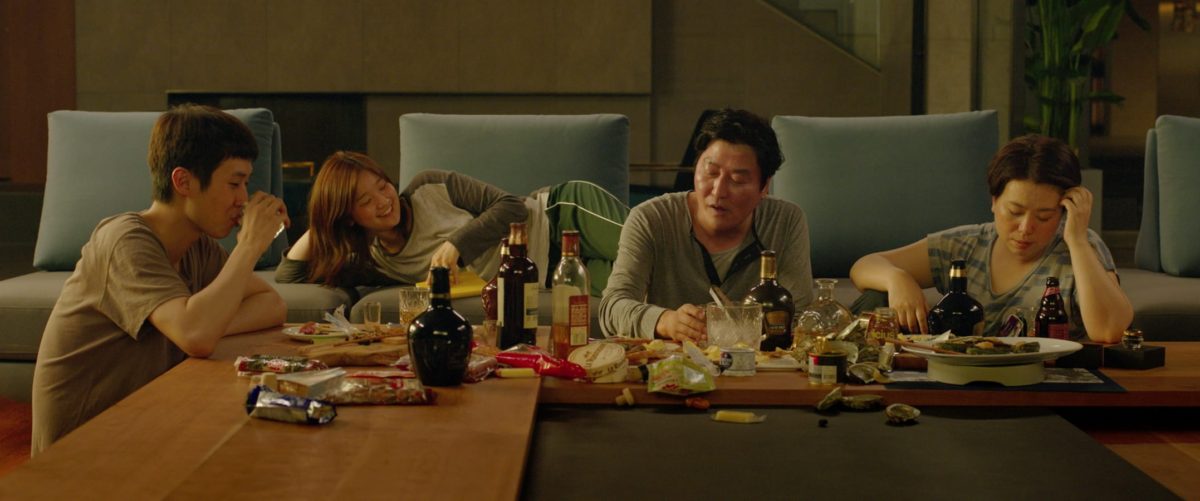Despite earning near-universal acclaim and an historic Oscars run, Parasite‘s reliance on Hollywood conventions complicates its class-conscious message
Editor’s note: This is a full-film analysis and therefore contains spoilers.
When Bong Joon-ho’s Parasite (2019) swept four major categories at the Academy Awards earlier this year — Best Original Screenplay, Best International Feature, Best Director and Best Picture — American media were quick to celebrate the film. The next day, The Atlantic ran with the headline “Parasite Won So Much More Than the Best Picture Oscar.” As author Hannah Giorgis elaborates, Parasite’s win was historic as the first international film to win that category, not to mention that it was the first South Korean film to receive any recognition by the Academy of Motion Picture Arts and Sciences. Writing for Vox, Alissa Wilkinson exclaimed that Parasite deserved to win Best Picture because its understanding of “class and income inequality is more nuanced than other films from the same year,” like the most-nominated film, Todd Phillips’ Joker. Wilkinson argues that this nuance lies in how Bong refuses to present his working-class protagonists as heroes or reduce its bourgeois antagonists to cartoonish villains.
Speaking of which, President Donald Trump also weighed in on Parasite’s big night at a rally a few days later in Colorado Springs, Colorado. In what can only be described as a hilarious clip, Trump tries to work up the crowd into getting mad about a South Korean film winning Best Picture in place of an American one, bemusedly asking if it was “any good” and lamenting that we no longer have movies like Gone with the Wind (1939) or Sunset Boulevard (1950). It’s so deeply funny because Trump doesn’t have the attention span to watch either of those movies; but they’re good examples to use if you want to sound like you know something about the artistry of classical Hollywood cinema.
No less funny or reactionary was Maureen Dowd, who penned an op-ed in The New York Times scoffing that Trump should “empathize with parasites.” Dowd is referring here to the Kim family, the working-class protagonists of the film, who in her words are “con artists who invade an elegant house and wreak chaos.” But most everyone else will recognize that the Kims, who have to do everything they can just to survive in a country of deep wealth disparity, are the characters we’re meant to sympathize with.
But perhaps Dowd is not entirely wrong to read the film this way. Maybe it makes sense that Barack Obama and Elon Musk celebrated Parasite, despite the film’s class politics seemingly being antagonistic to their class position. Bong’s film has something of a crystal ball quality to it, where it means all things to all people. In this regard, Bong’s film is much closer to Hollywood than we might like to believe, given that it is a perfect example of the kind of “access for all” filmmaking that film scholar Thomas Elsaesser has defined as characteristic of Hollywood blockbusters like Avatar (2009). But the problem with Parasite runs much deeper than just very wealthy people comically misunderstanding the film, and it has everything to do with the recognition that it received by the Academy. More precisely, the issue lies in the fact that it is a film made for the Academy. This is evidenced by Bong’s decision to use the very language of Hollywood genres to present this story of wealth inequality, and specifically his use of the conventions of a thriller. I would argue that it is precisely the aesthetic of the thriller, which by definition privileges alienation, suspicion and suspense, that nullifies any positive working-class message in Parasite.
The Kims are our entryway into the life of the South Korean proletariat. The family comprises father Ki-taek (Song Kang-ho), mother Chung-sook (Jang Hye-jin), son Ki-woo (Choi Woo-shik) and daughter Ki-jung (Park So-dam). Living in a cramped semi-basement apartment, the Kims get by through grift and cunning. They recognize a shot out of their situation when Ki-woo takes a job as an English tutor for the daughter of the wealthy Park family. After making a strong impression on the gullible mother Yeon-kyo (Cho Yeo-jeong), Ki-woo brings Ji-jung in as a bogus art therapist for the Parks’ young son; shortly after that, Ki-taek joins as the Parks’ driver. Finally, Chung-sook takes over as housekeeper after the Kims oust Moon-gwang (Lee Jung-eun) in a ruse.
But in time, the entire facade collapses. One night, while the Parks are away on a camping trip and the Kims have fully availed themselves of the luxuries of their home, Moon-gwang returns to reveal a horrific reality. For years, her husband, Oh Geun-sae (Park Myung-hoon), has been living in a secret bunker underneath the Park home to evade loan sharks. While working for the Parks, Moon-gwang has been quietly slipping food to him. Moon-gwang pleads with the Kims to allow Oh Geun-sae to stay, but they refuse; in turn, Moon-gwang threatens to expose the Kims as frauds. After a physical fight with her, the Kims ultimately lock a nearly dead Moon-gwang in the basement with Oh Geun-sae, and from that moment on, the Kims anxiously try to keep up appearances as they worry about what might emerge from the basement.
And the worst eventually does happen. During a birthday party for the Parks’ son, Ki-woo goes into the bunker to kill the prisoners, where he learns that Moon-gwang has succumbed to her injuries from their fight. Oh Geun-sae nearly kills Ki-woo and escapes from the basement, reaching the party. The result is a horrifying bloodbath that results in the deaths of Oh Geun-sae and Ki-jung. The Park father Dong-ik (Lee Sun-kyun) is killed by Ki-taek, who flees the scene and hides himself in the Parks’ basement. After several months recovering in the hospital and having been convicted of fraud, Ki-woo vows to make enough money to buy the Park home and be reunited with his father, and we see him imagining Ki-taek coming out of the basement to see his son. But, as Bong implies, social mobility is impossible in South Korea. A Kim family reunion can only exist in fantasy.

Parasite is such a compelling and entertaining film because of how Bong makes economic precarity and class conflict into a visceral experience for his audience. We are constantly on edge as we worry about the fate of the Kim family. But this is also what presents a major issue for the film’s politics, because despite Moon-gwang and Oh Geun-sae occupying the same class position as the Kims, our sympathies are not directed to the husband and wife. Or they are, but in a very limited way. Like the Kims, Moon-gwang and Oh Geun-sae do not seem like bad people per se, but they have been reduced to a desperate economic situation and make decisions based on survival. Bong’s critique of capitalism lies precisely in this logic: Rather than the two families working together to change their situations, they fight each other and both end up losing in the end. In other words, the film is not about the families joining forces to cast the Parks out of their home, or, even more radically, join forces with other working-class families to incite a revolution. It might seem that the moment when Oh Geun-sae terrorizes the South Korean upper crust at the birthday party represents a call to revolution, to disrupt their comfortable lives that are made possible only by the suffering and silencing of the working-class. But I would argue against this because the point of the scene is that the Kims are in just as much danger as the Parks. This does not mean that their class differences are erased, but we are meant to view Oh Geun-sae as a threat to the Kims. On a visceral level, it does not matter that they occupy the same class position.
If Bong did things differently, perhaps nothing much would have changed. But I suspect that if Parasite offered an unwavering endorsement of the idea that the rich have to be violently overthrown by a working-class insurgency, Academy members would be less inclined to vote for it as the best movie of the year. If the film were to successfully call a revolution of the proletariat, I would insist that it still could not do so as a thriller. Consider in contrast the ideology and the aesthetic behind Soviet montage. The idea behind Sergei Eisenstein’s The Battleship Potemkin (1925) and October (1927), Alexander Dovzhenko’s Earth (1930) or Dziga Vertov’s Man with a Movie Camera (1929) was to have the proletariat see themselves represented in the characters on screen, and even more, to be energized into awareness and action by experimental editing techniques. The Italian neorealists took up a different approach with a similar philosophy. Vittorio de Sica’s Bicycle Thieves (1948) or Umberto D. (1952) focus their audiences on the daily realities of everyday life of the working-class, with camerawork that is dedicated more to observation and reflection than action. In short, these moments in global cinema were predicated on the idea of offering an alternative to the aesthetic perfection and artifice of Hollywood. Parasite does not offer this alternative.
Parasite is certainly not the first acclaimed international film to address social and economic inequality through a familiar, American cinematic language. Mexican-born director Alejandro G. Iñárritu’s Oscar-nominated Amores Perros (Love’s a Bitch, 2000) — a triptych where two of its three intersecting stories are about the Mexican working-class and under-class, and the one in the middle is about the country’s emerging bourgeoisie — was such a success that it spurred a wave of Latin American filmmaking that saw an unprecedented degree of global popularity, including fellow Mexican-born director Alfonso Cuarón’s Y tu Mamá También ( 2001), and Cidade de Deus (2002), by Brazilian filmmakers Fernando Meirelles and Kátia Lund. Twenty years later, all three works can be pointed to as seminal films not just in the histories of Mexican and Brazilian filmmaking, but global cinema. The reason goes beyond how they impressed audiences the world over and includes how the filmmakers were inspired by the techniques outside their home countries. For instance, Y tu Mamá También is like a New Hollywood road movie across rural Mexico that features the extended long takes out of the French New Wave or Italian neorealism before it. Amores Perros and Cidade de Deus both feature a great deal of handheld camerawork, bleach-bypass, nonlinear storylines, rapid and discontinuous editing and a high amount of sensational violence. To this end, Amores Perros is sometimes seen as the Mexican equivalent of Pulp Fiction (1994), and Cidade de Deus, based on “real” stories from the favelas of Rio de Janeiro, is clearly influenced by Iñárritu’s film and the gangster genre.
It might feel silly to suggest that Bong should have gone in a more radical direction. And maybe it is silly to suggest, since it’s basically asking for Parasite to be a different movie than what it is. But if that’s the case, we have to be clear that both the message and the aesthetic behind Parasite make it very convenient and easy for the film to achieve such widespread recognition, specifically at the Academy Awards.
As a thriller, Parasite is based on the audience’s skepticism of what they see and hear, and this distrust is what entertains viewers with feelings of fear and suspense. When we see Moon-gwang come back to the Park home after she is cast out, her return is highly conspicuous. She appears out of nowhere and tells the Kims that she has disabled the security cameras along the street. She asks the family to let her into the house as she presses her face against the Parks’ security camera. It is not that she looks threatening, exactly, but she is disheveled enough that it gives the Kims and the audience cause for alarm. This feeling is heightened by the fact that she returns at the exact moment the Kims seem to have conned their way to the top. Any viewer who has seen a thriller or horror film knows that this sort of return brings misfortune. And it is precisely for this reason that we, as viewers, are supposed to not want the Kims to let Moon-gwang in. We suspect, just as they do, that something is wrong. As such, Bong is effectively asking us to root for one family of workers and root against another. Maybe it is a tragedy that the Kims only want to look out for themselves, but based on how we have been trained to watch movies, we want them to do this. We care too much about the Kims to see them endangered. We’d rather it be the other family who loses.

Despite my problems with Parasite, I don’t want to suggest it lacks any critical bite or political significance. In response to the film’s global popularity, the South Korean government has announced plans to improve the living conditions for those living in the country’s semi-basement apartments, though this proposal is incredibly modest and would not be extended to all affected families. Furthermore, Ju-Hyun Park has written compellingly about the film as an anti-colonialist allegory, with a particular attention to how Bong uses English to denote power and class mobility, as well as how the Parks’ choice of a cowboys vs. Indians theme for their son’s birthday party is a fitting metaphor for the U.S. empire’s conquest of the global South. But their reading is so meticulous and detailed that I think it’s fair to say many audiences around the globe, and certainly the Academy of Motion Picture Arts and Sciences, are not going to pick up on some details. To the Academy, Parasite is simply a well-made and thematically relevant film.
And that is the problem. Since Parasite conforms to certain standards of quality, it can be absorbed into the industry and appreciated by an elite who would be deeply offended by a more antagonistic and less conventional film. After all, let’s not forget that in the midst of the attention for Parasite, Bong announced plans for the film to be turned into a series in partnership with HBO. That’s not to say Bong shouldn’t have his show or have even more opportunities to work in American entertainment if he wants to; he’s been doing it for years and he’s a very good filmmaker by industry standards. And it’s fine to enjoy Parasite for what it is. But let’s not make the mistake of enjoying it for what we want it to be.
Purchase Parasite on Blu-ray/DVD from the Criterion Collection here
Follow Frankie and Split Tooth Media on Twitter
(Split Tooth may earn a commission from purchases made through affiliate links on our site.)





